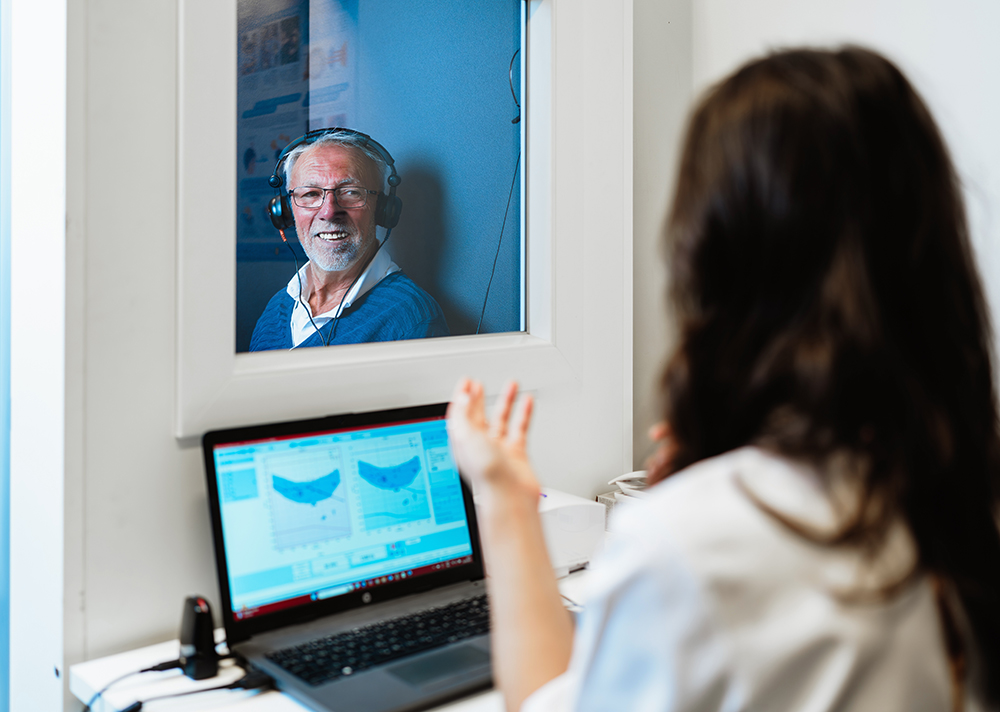The Role of Hearing Tests in Preventative Health Care
Hearing tests are an important part of preventative health care, yet many
New Location Now Open in Fort Mitchell! LEARN MORE →

By: Vanessa Ewert, Au.D, LIC.-A | December 23, 2024
Taking the first step to check your hearing often comes after noticing small changes in your daily life – maybe you’re turning up the TV volume more than before, or finding it harder to follow conversations in busy places. Your first hearing consultation is simply a conversation about your hearing health and how it affects your daily activities. We want you to feel prepared and comfortable when you come in, knowing what to expect and what questions you might want to ask.
Whether you’re coming in because family members have mentioned concerns or because you’ve noticed changes yourself, this appointment is about understanding your specific situation and finding the right solutions for you.
As you go through life, you may start noticing certain sounds aren’t as clear as they used to be. Maybe you’re asking people to repeat themselves more often, or the TV volume doesn’t seem loud enough anymore.
These could be signals that it’s time for a hearing consultation. Recognizing these changes isn’t a sign of weakness, but a proactive step towards keeping your quality of life high. A hearing health professional can provide you with the tools and knowledge to manage any changes in your hearing effectively.
Just like you book regular appointments for your eyes or teeth, your ears need the same ongoing care and attention. Regular hearing consultations play a key role in maintaining your overall hearing health.
Changes in hearing can often be gradual and hard to notice without professional help. Regular visits to a professional can spot these small shifts in your hearing abilities, ensuring quick action on any potential problems.
In addition, these consultations are more than just a way to detect issues – they’re also a chance to learn. Hearing health professionals give valuable advice on protecting and improving your hearing, offering custom strategies that fit your specific needs and lifestyle.
When you’re getting ready for your appointment, keep in mind that your medical history is an important part of the picture. It gives valuable insights that can help your audiologist create a treatment plan that meets your unique needs. Here’s what you should focus on:
Preparing for your first hearing consultation might seem daunting, but doing a bit of self-assessment beforehand can be really helpful. Start by noting any changes you’ve noticed in your hearing. Are you turning up the TV volume more than you used to? Or are you finding it harder to follow conversations in noisy places? These observations can give your audiologist valuable insights into your situation.
Another helpful strategy is to note any times when you’ve felt that your hearing has affected your daily life. Maybe you’re avoiding social situations because you’re having trouble understanding speech, or perhaps you’re feeling more tired because of the extra effort needed to listen. Sharing these experiences with your specialist can help them understand the impact on your life and guide them in recommending suitable treatment options.
This isn’t about diagnosing yourself – it’s about giving yourself information to have an effective conversation with your hearing health professional. Your observations and experiences, combined with their expertise, will ensure that you get the most from this crucial consultation.
When you’re getting ready for your hearing consultation, there are a few key items that you should bring with you. It’s important to have a list of all the medications you’re currently taking, including over-the-counter drugs, supplements and prescriptions, as they can all potentially affect your hearing health.
Another key item is any hearing aids or devices you might already be using. These will give valuable information to your audiologist about what has worked for you and what hasn’t. Also, think about bringing a close friend or family member with you to the appointment. They can offer additional insights into how your hearing loss might be affecting your daily life and communication, which could be helpful in determining the most effective treatment options for you.
Knowing the steps in a hearing test can help you approach this process with more confidence. A typical hearing test, also known as an audiometric evaluation, is a painless procedure that measures your ability to hear different sounds, pitches and frequencies.
The first step is usually a physical examination of your ears using an otoscope. This lets the audiologist check for any visible issues like earwax buildup or infections that could be affecting your hearing. Next is the pure-tone test where you’ll wear headphones and respond to a series of tones at different frequencies by pressing a button or raising your hand. This helps find out the quietest sound you can hear at each frequency tested.
After this, you might have speech testing which measures how well you can understand words at different volumes and pitches. It’s an important step because it’s similar to everyday listening situations. By knowing these steps in advance, you’re better prepared for what’s ahead during your hearing consultation!
After your hearing test, you’ll be given an audiogram – a visual representation of your hearing abilities. This graph shows the softest sounds you can hear at different pitches or frequencies. It might look a bit complicated at first, but don’t worry – it’s simpler than it looks.
The vertical axis on the audiogram represents volume (measured in decibels), while the horizontal axis shows frequency (measured in Hertz). Your audiologist will help you understand this graph, showing you how your hearing varies across different pitches and volumes. Understanding your audiogram is key to understanding your hearing health. It’s more than just a chart; it’s a roadmap to better communication and improved quality of life.
Treatment options for hearing loss are diverse and tailored to your specific needs. From hearing aids to assistive listening devices, each solution is designed to enhance your communication abilities and improve your quality of life.
Hearing aids are a widely recognized treatment option for addressing various types and degrees of hearing loss. They amplify sounds to make communication and environmental awareness easier, helping individuals reconnect with the world around them. Whether someone has mild-to-moderate hearing loss or a more profound level of difficulty, modern hearing aids are designed to accommodate a range of needs. Different styles and features ensure there is a solution suitable for each individual’s lifestyle, preferences and the specifics of their hearing loss.
Advancements in hearing aid technology have made it possible to tailor these devices for nearly every type of hearing loss. For example, directional microphones and noise-canceling features can assist individuals with mild hearing loss in social settings, while more advanced systems like frequency compression can aid those with severe or high-frequency hearing loss.
As you talk with your audiologist, deciding on the right treatment options becomes the next important step. The goal is to find a solution that best fits your lifestyle and hearing needs. Through a comprehensive hearing assessment, they identify the type and degree of your hearing loss and use this information to recommend hearing aids with features that address your specific challenges. Audiologists also take into account factors like your daily activities, communication goals and physical preferences to ensure the device fits seamlessly into your life. By offering expert guidance and ongoing support, they make the process of choosing and adjusting to hearing aids more personalized and effective.
After your consultation, you might find yourself overloaded with information. That’s completely normal! It’s important to take some time to process everything that was discussed during your appointment. Reflecting on the information shared by your audiologist can help clear up any doubts and guide you towards making an informed decision about your hearing health.
Think about the different treatment options that were presented and how they fit with your lifestyle and personal preferences. There’s no need to rush this decision. You have the freedom to take as much time as you need to think things through.
Making notes during or after the consultation can be helpful in remembering key points discussed, especially when it comes to treatment options and their benefits. If you’re unsure or have more questions, don’t hesitate to reach out to your hearing health professional for clarification. They are there to support you every step of the way!
This reflection after the consultation is an important part of your hearing health journey. It allows for thoughtful consideration of all aspects discussed during the consultation and plays a key role in guiding you towards an informed decision that best suits your needs.
Adjusting to life with hearing aids can feel like a big step, but it’s one that opens the door to clearer communication and a richer connection with your surroundings. Initially, sounds might seem louder or unfamiliar as your brain re-learns to process them. This is completely normal and part of the adjustment process. To ease into wearing them, start in quiet environments and gradually introduce more complex settings. Consistent use is key, even if it feels unusual at first, as this helps your brain adapt and improves your overall listening experience.
Support from your specialist is invaluable during this time. They can fine-tune your devices to ensure they’re meeting your specific needs and address any challenges you encounter. Patience is essential – allow yourself time to get used to the new sounds and sensations. With persistence and guidance, hearing aids become a natural part of your daily routine, helping you stay engaged and confident in conversations and activities you love.
Your first hearing consultation is a big step towards understanding and managing your hearing health better. It’s not just about finding a solution, but also about equipping yourself with knowledge and building a relationship with your audiologist who can guide you on this journey. From getting ready for the appointment to reflecting after the consultation, each step has its own importance in making sure you get the most out of this experience.
If you’ve been noticing changes in your hearing or if it’s time for a regular check-up, don’t hesitate to contact Bluegrass Hearing Clinic at (859) 295-5729. With numerous locations across Kentucky, including Bardstown, Danville, Elizabethtown, Frankfort, Lexington, Mount Sterling, Nicholasville, Paris, Richmond and Somerset – expert help is never too far away. Your path towards better hearing health starts with that first consultation. Every question asked brings you closer to understanding and every concern addressed brings peace of mind.

Hearing tests are an important part of preventative health care, yet many
By: Vanessa Ewert, Au.D, LIC.-A | November 18, 2025

Living with tinnitus means dealing with sounds that only you can hear,
By: Vanessa Ewert, Au.D, LIC.-A | October 3, 2025

When you’re getting your hearing tested, you might be surprised by
By: Vanessa Ewert, Au.D, LIC.-A | September 24, 2025
